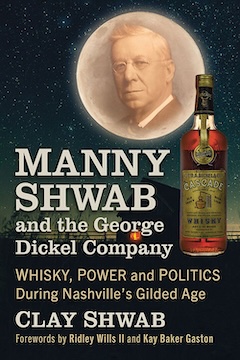Manny Shwab and the George Dickel Company: Whisky, Power, and Politics During Nashville’s Gilded Age (excerpt)
Manny Shwab had a profound impact upon the politics, economics, and the modernization of Tennessee. Having learned the business of spirits from his Alsatian Jewish immigrant father, he rose from a 16-year-old, decidedly successful, smuggler of whiskey, weapons, medicines, and clothing through the Union lines of occupied Nashville to become a founder and eventual sole owner of GDC and Tennessee’s most prosperous distillery, Cascade Hollow. As he, more than any other Tennessean, fought the relentless encroachment of Prohibition, he would repeatedly be described as “owner” of Tennessee politics for almost four decades. In addition to GDC, he was a developer and director of several prominent banks, the Nashville Power Company, Nashville’s first telephone organization, and three railroads, as well as the owner of the most successful and architecturally renowned saloons (and brothels) in Nashville, in addition to more than a dozen downtown Nashville properties. His obituaries declared him the wealthiest man in Nashville and one of the wealthiest and most influential in the South. But, except for newspaper accounts and legal records, he is virtually absent from the histories of the region.
Relying on delightfully embroidered, pre-Hemingway-style newspaper articles and police records to track events and stories associated with the V. E. Shwab family, from the immigration of Manny’s father, Abram, through V. E.’s death in 1924, glimpses of 19th- and early-20th-century life in Knoxville, Nashville, and the South are revealed. Stories emerge of a Jewish immigrant to the prewar South with Confederate involvement; the introduction of fine wines and spirits from France to the region; smuggling; brothels; police raids; devastating fires; a thwarted lynching; the killing of a senator; police and political manipulations; the best whiskey in America; the nation’s obsession with alcohol, pro and con; the largest federal seizure in history; and a man known as a “one-man Tammany Hall,” who capitalized upon the opportunities arising from the explosion of postwar ideas, technologies, and political divisions. While Manny was creating an individual empire, his siblings were making waves in their own, more narrowly defined arenas: theatrical entertainment, classical music, and whist.
Cascade Whisky
On a recent trip to England, when told we were from Tennessee, our Uber driver beamed and exclaimed, “Elvis and Jack Daniel’s!” Worldwide, those two names are synonymous with the state. Elvis forever stands alone, but before the rise of Jack Daniel’s, there was a much better-known and predominant Tennessee Sour Mash label, distributed by the George Dickel Company: Cascade Whisky, “Mellow as Moonlight.” By 1909, Victor Emmanuel “Manny” Shwab’s Cascade Hollow Distillery had become so prominent that when seized by the federal government, it was the largest seizure of any kind in history. Newspapers around the country, covering the event, declared Cascade Hollow “the most valuable property of the kind in the state.” To demonstrate Cascade’s importance to Tennessee, the April 6, 1909, Nashville American pointed out that the distillery’s four-year tax burden amounted to $1,200,000 ($34 million in today’s dollars), which represented 25 percent of taxes paid by all the distilleries, including Jack Daniel’s, in Middle and West Tennessee combined.
Cascade Whisky had acquired a national, and even international, reputation as the premier American whiskey. Famed distiller and whiskey aficionado Pappy Van Winkle (whose whiskey today sells in excess of $1,000 a bottle) called it “the great Cascade whiskey” stating, “… [I]ts like has not been seen since Prohibition.”1 In addition to the whiskey’s excellence, resulting from the skills of master distiller McLin “Kie” Davis, its recognition was due to the business acumen of V. E. Shwab and his subsequent use of the newly founded ad agency D’Arcy. At the time, D’Arcy’s other significant endeavor was the launch of a nonalcoholic, yet quite stimulating, libation, Coca-Cola.
But today, Jack Daniel’s is a household name around the world; Shwab’s George A. Dickel Company (GDC) and Cascade Whisky are not. The Dickel company, now owned by the British spirit behemoth Diageo, has slowly come back to a level of prominence, but Cascade Whisky and Manny Shwab have faded into obscurity. Reviving their story enriches the history of Tennessee, its whiskey, and the state’s relationship with it. In addition, Manny’s and his family’s journey from the 1850s through the Civil War, World War I, and the monumentally divisive, sometimes brutal, fight against Prohibition opens doors to fascinating, often forgotten, events that shaped Tennessee and the South.
 >
>